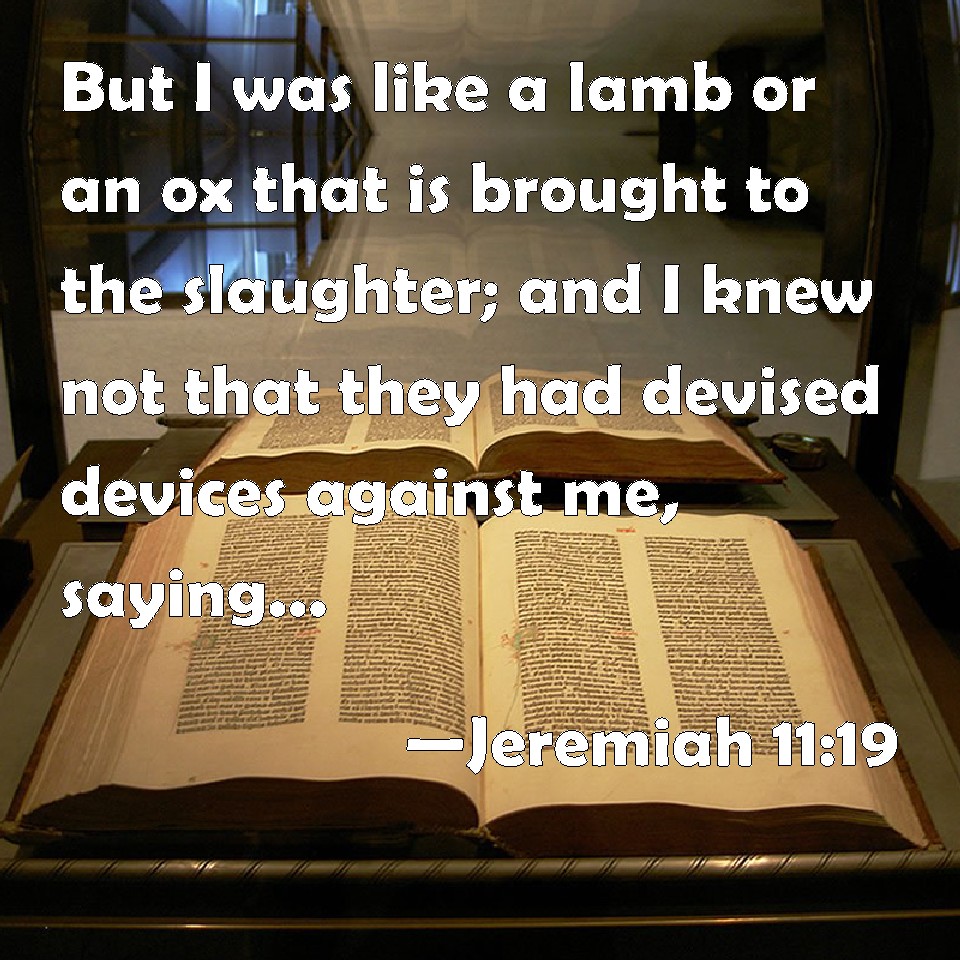The Scripture readings for the last day of the 4th
week of Lent, Jeremiah 11:18-20; John 7:40-53, parallel prophet Jeremiah and
Jesus. How? They are both objects of persecutory conspiracies. They became
targets of persecution because of their work for God. They were persecuted
because of those who were wicked and those who blind to God’s truth. As the Holy
Week is drawing near, we also notice the progression of the evil plot to kill
Jesus in the daily Scripture readings this week and next week.
Those who made Jeremiah the target of their
persecutory conspiracy, made him feel like being a gentle lamb led to the
slaughter (Jeremiah 11:19) are those who ignored King Josiah’s efforts of
spiritual reform and continued to live with sins, being away from God. Those
who wanted to arrest and kill Jesus were religious leaders, who viewed Jesus as
a man of blasphemy for speaking and acting as if the Messiah, because of their
utter ignorance.

From the chapter 2 on, Jeremiah put his prophetic
warning against the wickedness of his people. He knew how the wickedness of his
people had led his nation, Judah, into the Babylonian seize of Jerusalem,
resulting in the Babylonian exile. Jeremiah knew that the tragedy of having
Jerusalem destroyed by the Babylonians and the humiliation of being in exile in
the land of the invaders were consequences of the wickedness of his people,
defying King Josiah’s sincere efforts of reform.
Jeremiah must have hoped for a new fresh start as King Josiah had hoped. And,
God commissioned him as His prophet to send His message for conversion so that
they could reform themselves – their kingdom. Otherwise, they would face the
Babylonian invasion. In today’s first reading (Jeremiah 11:18-20), we see a snapshot
of how Jeremiah’s own town folks in Anathoth were reacting to his prophecy.
They were plotting to wipe out not only Jeremiah but his name out of history,
as well: “Let us destroy the tree in its
vigor; let us cut him off from the land of the living, so that his name will no
longer be remembered”(Jeremiah 11:19).
And, Jeremiah had already sensed this threat to himself.
The wickedness that refused to listen to God’s
message in Jeremiah’s prophecy, reflecting King Josiah’s spirit, but to desire to
wipe our him, instead, is the kind of wickedness reflected in the first reading
of yesterday (Wisdom 2:1a, 12-22).
This kind of murderous wickedness to get rid of God’s
servants for conversion and reform remained stubborn – even during the
post-exilic age, in spite of the post-exilic prophet’s strenuous efforts.
Penance during the exile and conversion for the fresh start at the beginning of
the post-exilic restoration of Jerusalem did not last long. As it is reflected in today’s Gospel reading
(John 7:40-53), this kind of wickedness was again rampant, after about 600
years from the Jeremiah’s time in the first reading. And, the same wickedness
turned into a conspiracy to kill Jesus!
In the Gospel reading today, continuing on yesterday’s Gospel reading and
narratives prior to that, you can see the persecutory conspiracy against Jesus
in its development. The religious leaders, including the Pharisees, who were
proud of their expertise in the Mosaic Law, were becoming progressively
irritated and indignant about how Jesus performed miracle signs and preached
from Galilee to Jerusalem. While the leaders had become determined to arrest
and kill Jesus, some people wondered that Jesus could be the prophesized
Messiah. As yesterday’s Gospel reading (John 7:1-2, 10, 25-30) describes, the
public reaction to Jesus’ actions and words resulted in a division between those
who refused to see him as the Messiah but to see him a blasphemer, deserved to
be killed according to the Law, and those who wonder about a possibility of
Jesus being the Messiah, as well as those who began to believe him as the Messiah.
Today’s Gospel text (John 7:40-53) gives a continuing story about the division
with an eye on the progression and stumbling of the wickedness’s plan to kill
Jesus.

The wicked religious leaders, determined to kill Jesus, were frustrated about
the guards’ failure to arrest Jesus on the spot. The guards did not arrest him
for two possible reasons: It was not yet the time for Jesus to be arrested for
execution as he had not consummated his mission yet; and the guards had
wondered themselves about a possibility of Jesus to be the Messiah (John 7:46).
To this, the leaders, who commissioned the guards to arrest Jesus, rebuked the
guard, indicating that their failure to arrest Jesus was attributed to their
ignorance of the Law, saying, “Have you
also been deceived? Have any of the authorities or the Pharisees believed in
him? But this crowd, which does not know the law, is accursed”(John
7:47-49). Yes, the plot to capture and kill Jesus stumbled because of a
possibility of Jesus being the Messiah, not only among some people but even
among the guards.
Of course, the religious leader’s wickedness stems from their own ignorance
about the Messiah, as reflected in the Gospel reading of the 4th Sunday
of Lent (John 9:1-41) and the Gospel reading of Tuesday of the 4th
week of Lent (John 5:1-16). In John 5:16, you can recall how the ignorance of
Christ is associated with the murderous wickedness to kill the Messiah.
It was actually Nichodemus, who pointed out how
ignorant the leaders, who wanted to kill Jesus, were – how ignorant they were
about the Law, of which they were so proud to know, on their own narcissistic
accounts, saying, “Does our law condemn a
person before it first hears him and finds out what he is doing?”(John
7:51), figuratively reflecting the Torah wisdom in Deuteronomy 1:16-17.
Yes, there was a leader, like Nichodemus, who did not lose his sight, in spite of the progressively increasing darkness to kill Jesus.

No comments:
Post a Comment